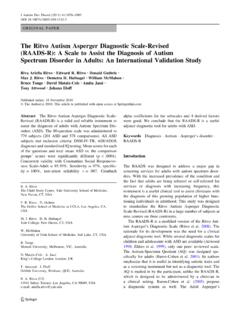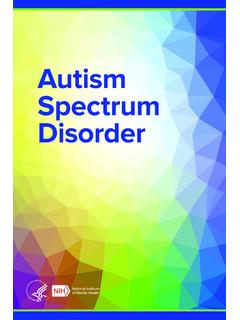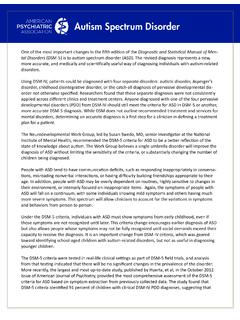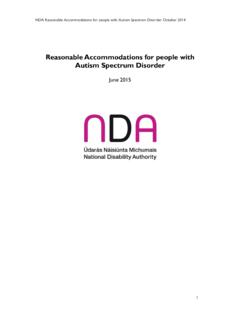Transcription of Mental Health Assessment Tools
1 Mental Health Assessment Tools Contributed by Christy Gauss, MSW; Natalie Bengert, BS; and Josie Kincaid, BS; Catherine Davies, LMHC updated June 2020. Below is a list of Mental Health assessments that can be used in educational settings and beyond. This list does not represent an endorsement of any one tool and is not inclusive of all possible Tools . This list is simply to assist in accessing a range of options related to school climate, trauma, anxiety and other Mental Health topics. NOTE any materials found at require signing up for a free SHAPE account in order to access. Anxiety Children's Yale-Brown Obsessive Compulsive Scale (CY-BOCS). Rates severity of symptoms. Age range: 6-17 years. Generalized Anxiety Disorder- 7 (GAD-7).
2 Screening tool for initial symptoms. Age range: 11-18 years. & Assessment /74. Multidimensional Anxiety Scale for Children (MASC 2). Distinguishes between anxiety symptoms and dimensions that broader measures do not cover. Age range: 8-19 years. Assessments/Personality-Biopsychosocial/ Multidimensional-Anxiety-Scale-for-Child ren-C-Second- Edition/ Penn State Worry Questionnaire for Children (PSWQ-C). Assesses worry and monitors changes in symptoms over time. Age range: 7-18 years. & Assessment /79. Revised Child Anxiety and Depression Scale (RCADS). Assesses defined anxiety and depression. Age range: 8-18 years. & Assessment /80. Revised Children's Manifest Anxiety Scale (RCMAS 2). Identifies the source and level of anxiety. Age range: 6-19 years.
3 Screen for Child Anxiety Related disorders (SCARED). Screens for symptoms across five subscales of anxiety. Age range 8-18 years. Social Phobia and Anxiety Inventory (SPAI). Assesses symptoms, cognitions and behaviors to measure social anxiety. Age range: 14+ years. Spence Children's Anxiety Scale (SCAS). Assesses severity of anxiety symptoms. Age range: 3-15 years. & Assessment /84. 1. Indiana School Mental Health Initiative Indiana Institute on Disability and Community Indiana University, Bloomington 2810 E Discovery Parkway Bloomington, IN 47408-9801 812-855-6508 Bipolar disorders Child Mania Rating Scale (CMRS). Assesses symptoms of a manic episode. Age range: 5-17 years. & Assessment /67. Parent-Young Mania Rating Scale (P-YMRS).
4 Identifies those at risk of mania and severity of symptoms. Age range: 5-18 years. & Assessment /76. Depression Beck Youth Inventories 2nd Ed Assesses symptoms of depression, anxiety, anger, disruptive behavior and self-concept. Age range: 7-18. years. Assessments/Personality-Biopsychosocial/ Beck-Youth-Inventories-C-Second-Edition/ Children's Depression Inventory 2 (CDI 2). Comprehensive multi-rater Assessment of depressive symptoms. Age range: 7- 7 years. Center for Epidemiological Studies Depression Scale for Children (CSE-DC). Measures depressive symptoms. Age range 6-23 years. & Assessment /66. Depression Self-Rating Scale for Children (DSRS-C). Assesses symptoms within the past week, Age range: 8-14 years. & Assessment /414.
5 Patient Health Questionnaire-9 (PHQ-9). Assesses depression and suicide risk. Age range: 11-18 years. & Assessment /77. Revised Child Anxiety and Depression Scale (RCADS). Identifies diagnostic criteria. Age range 8-18 years. & Assessment /80. Eating disorders Eating Attitudes Test (EAT-26). Discriminates between behaviors in the average range and those that are risk signs for anorexia, bulimia and obesity. Age range 8-18 years. & Assessment /71. Eating Disorder Examination Questionnaire (EDE-Q). Assesses key behaviors associated with eating disorders . Age range: 14+ years examination/#:~:text=TheEatingDisorderEx aminationQuestionnaire,BCtheEDEDA. Emotional and Social Development Anger Regulation and Expression Scales (ARES).
6 Assesses inward and outward expressions of anger. Age range: 10-17 years. The Devereux Student Strengths Assessment (DESSA). Strength based rating of social-emotional competence. Age range: 5-18. Emotional Quotient Inventory: Youth Version Examines emotional and social functioning. Age range 7-18 years. 2. Indiana School Mental Health Initiative Indiana Institute on Disability and Community Indiana University, Bloomington 2810 E Discovery Parkway Bloomington, IN 47408-9801 812-855-6508 Profile of Mood States Second Edition (POMS 2). Assesses emotions and can be used over time to monitor inventions aimed at reducing negative affect. Age range: 13-17 years. Family Assessment Measure- III (FAM-III). Looks at family functioning across six parameters.
7 Age range 10+ years. General Mental Health and Behavior Behavioral and Emotional Screening System (BASC-3 BESS). Looks at a range of behavior-based strengths and weaknesses. Age range: 3-18 years. Assessments/Behavior/Comprehensive/BASC- 3-Behavioral-and-Emotional-Screening- System/ Brief Impairment Scale Assesses interpersonal relations, school functioning and self-care. Age range 4-17 years. & Assessment /411. Brief Psychiatric Rating Scale for Children (BPRS-C). Examines psychological and affective symptoms including psychosis. Age range: 3-18 years. C/#:~:text=BPRSDC21items, ,problemsofchildrenand adolescents. Conners Comprehensive Behavior Rating Scales (CBRS). Behaviors, emotions and social problems. Age range: 6-18 years.
8 Million Adolescent Clinical Inventory-II (MACI-II). Assesses Mental Health and behavior concerns. Age range 13-18 years. Assessments/Personality-%26-Biopsychosoc ial/Millon-Adolescent-Clinical-Inventory -II/ Pediatric Symptom Checklist (PSC). Screens for variety of Mental Health concerns. Age range: 3-18 years. & Assessment /78. Strengths and Difficulties Questionnaire (SDQ). Assesses positive and negative attributes of emotional, behavioral and social Health . Age Range: 2-7 years. & Assessment /85. Student's Life Satisfaction Scale (SLSS). Assesses positive indications of psychological well-being across five dimensions. Age range: 3-18 years. & Assessment /88. Student Risk Screening Scale (SRSS). Identifies behaviors that correlate with Mental Health difficulties.
9 Age range: 4-18 years. & Assessment /87. Youth Top Problems Allows clinicians to identify and monitor the most important issues for intervention. Age Range: 5-15 years. Resiliency Child and Youth Resilience Measure (CYRM). Captures resources that boost a child's resilience. Age range: 5-23 years. & Assessment /415. Resiliency Scales for Children and Adolescents (RSCA). 3. Indiana School Mental Health Initiative Indiana Institute on Disability and Community Indiana University, Bloomington 2810 E Discovery Parkway Bloomington, IN 47408-9801 812-855-6508 Profiles strengths and vulnerabilities. Age range: 9-18 years. School Climate and Interactions Authoritative School Climate Survey (ASCS). Looks at structure and support across the school including prevalence of bullying.
10 & Assessment /413. Conditions for Learning (CFL). Assesses for safe and supportive learning environments. Grades 2-12. & Assessment /68. Delaware School Climate Survey Assesses five areas that align with positive behavior supports and social emotional learning. Grades K-12. & Assessment /70. ED School Climate Survey (EDSCLS). Assesses engagement, safety and the environment. Grades 5-12. & Assessment /72. Identification with School Questionnaire (ISQ). Assesses student emotional engagement with school. Grades 8-12. & Assessment /75. School Academic Optimism Scale (SAOS). Assesses efficacy, trust and academic emphasis. Grades K-12. & Assessment /81. School Burnout Inventory (SBI). Assesses school related stress. Grades 8-12. & Assessment /82.





